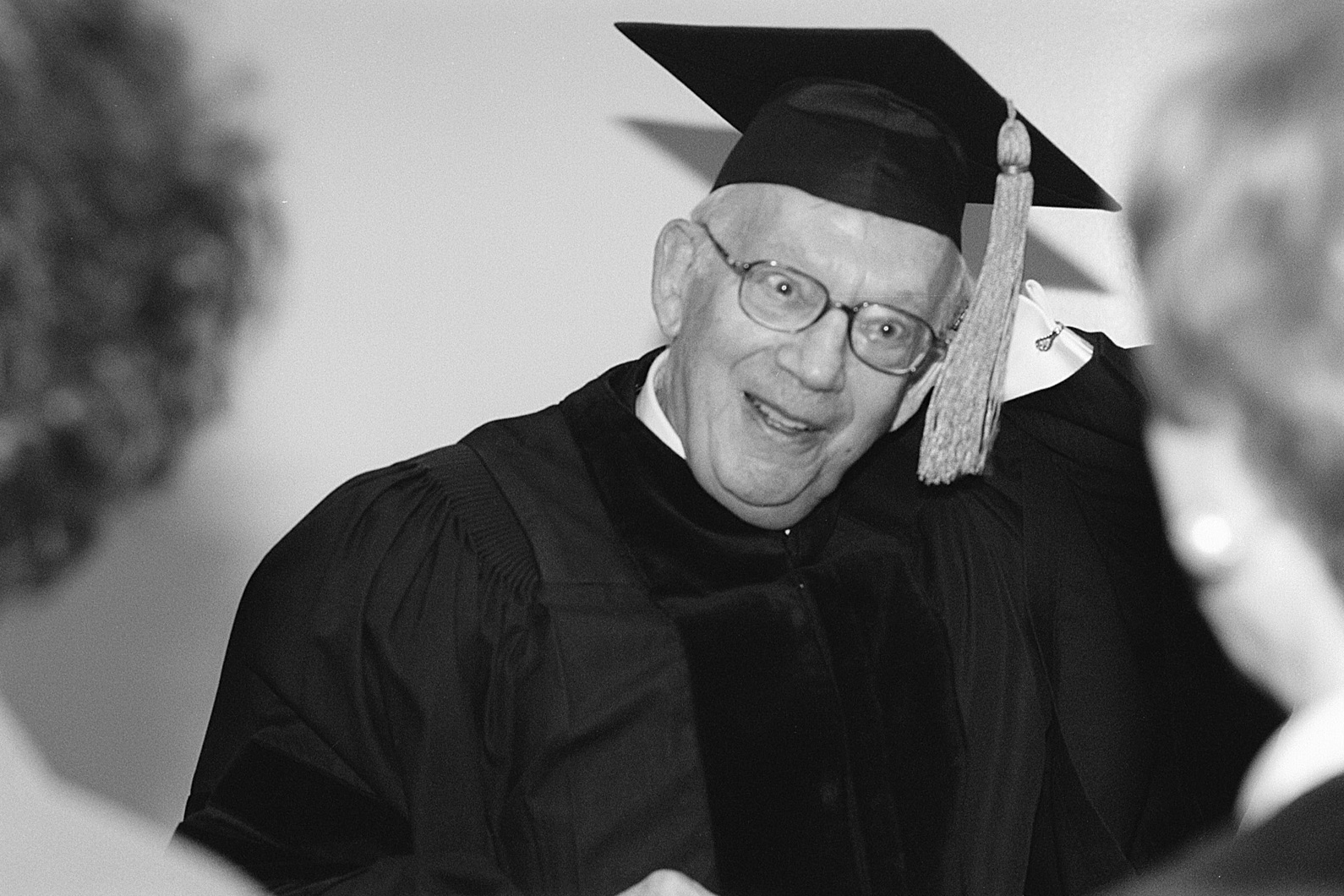Philanthropist Dr. Raymond Sackler died on July 17 after a brief illness. He was 97 years old. He and his wife Beverly have been generous donors to the University of Connecticut for more than 30 years.
Raymond Raphael Sackler was born in Brooklyn, New York, to Eastern European Jewish immigrants. He earned his undergraduate degree at New York University in 1938 and began medical school at Anderson College of Medicine in Scotland, where he volunteered in the United Kingdom’s home guard as a plane spotter in the first year of World War II. Due to the war, he completed his studies at the Middlesex University School of Medicine, on the site of current day Brandeis University in Waltham, Mass., where he received his medical degree in 1944. He was certified in psychiatry by the American Board of Psychiatry and Neurology, and later became a Distinguished Life Fellow of the American Psychiatric Association. In 1954, he married Beverly Galeski. They had two sons: Richard Sackler MD, and Jonathan Sackler.
A beloved husband, father, and grandfather, Sackler was noted in his early career for exploring the frontiers of psychopharmacology and the biology of schizophrenia and psychosis. In 1952, he and his brother, Dr. Mortimer Sackler, co-founded Purdue Pharma, a pharmaceutical business that continues to develop healthcare products and antiseptics for pain management, as well as respiratory and gastrointestinal conditions. As Dr. Sackler’s entrepreneurial business interests grew, so did his commitment to philanthropy. His interest in biomedical research and Mrs. Sackler’s passion for fine arts were the beginning of a three decades-long relationship with UConn, one of their many philanthropic beneficiaries. Through his individual gifts, as well as those from The Raymond and Beverly Sackler Foundation and The Raymond and Beverly Sackler Fund for the Arts and Sciences, he made transformative gifts of almost $5 million to advance critical medical research and fine arts.
Members of the ‘1881 Circle’ of the UConn Foundation’s Founders Society, the Sacklers’ relationship with UConn began with their support of the School of Pharmacy in the early 1980s. In the mid-1990s, they established The Raymond and Beverly Sackler Distinguished Lecture Series at the Thomas J. Dodd Research Center, which welcomes important scholars, activists, and officials from around the world to UConn to discuss the compelling human rights issues of our time. The series catalyzed the development of UConn’s internationally known human rights education and research programs, and continues to shine a light on injustice and the struggle to advance human rights.
Soon after, the Sacklers began their broad support for the School of Fine Arts, which includes an Artist-in-Residence program, a Master Arts Institute, a Music Composition Fund, the Metropolitan Opera Collaboration Fund, and the Fine Arts program, all bearing the name of these visionary arts leaders and patrons. Because of the Sacklers’ commitment to the arts, UConn students and faculty have been given opportunities to have in-depth collaborative experiences with internationally renowned performers and visual artists, enriching the fine arts curriculum, expanding creative research, and enlivening the cultural life of the entire University community.
“We are deeply grateful that Dr. Sackler supported life-changing experiences for students and faculty with the Sackler Artist-in-Residence program, expanding our opportunities for creative expression and professional practice in the arts,” says Anne D’Alleva, the dean of UConn’s School of Fine Arts, “and the SFA family extends our deepest condolences to Dr. Sackler’s family and friends.”
A recipient of an honorary doctorate of humane letters from UConn in 1998, Sackler expanded his philanthropic work into the University’s noted medical research arena in 1999, when The Raymond and Beverly Sackler Fund for Genetics and Molecular Medicine was founded. About 10 years later, the Raymond and Beverly Sackler Assistant Professorship began providing critical funding for faculty member Stormy Chamberlain to build a top-flight research team focused on stem cell research and neurodevelopmental disorders that afflict children.
Dr. Bruce Liang, dean of UConn’s School of Medicine, has often expressed his gratitude to Sackler over the years, and notes that his outstanding support will inspire the teams at UConn Health for years to come. “As the Sackler family and their many friends mourn the loss of Dr. Sackler, we will continue to strive for the excellence that he personally exemplified in his life and work,” Liang says.
Most recently, the Sacklers established The Raymond and Beverly Sackler Center for Biomedical, Biological, Physical, and Engineering Sciences. With a vanguard approach to next-level treatments for musculoskeletal injuries – and led by internationally known medical researcher Dr. Cato Laurencin – the Center is breaking ground in the new field of regenerative engineering, which represents a convergence of tissue engineering, advanced materials science, physics, stem cell science, and developmental biology.
“We have lost a great friend and a great man,” says Josh Newton, president and CEO of the UConn Foundation, “and our hope is that his family’s grief is soothed by happy memories of this wonderful father, physician, businessman, and philanthropist.”
Adds University President Susan Herbst, “Dr. Sackler’s legacy runs wide and deep. His life’s work and generosity helped us discover new knowledge in regenerative engineering, genetics, and rare neurodevelopmental disorders. The Sacklers’ support for the arts has helped students and artists hone their crafts and make substantial contributions to our culture. For that and more, we are a grateful University and a grateful state.”



